technical specifications FIAT DUCATO 2007 Owner handbook (in English)
[x] Cancel search | Manufacturer: FIAT, Model Year: 2007, Model line: DUCATO, Model: FIAT DUCATO 2007Pages: 282, PDF Size: 4.49 MB
Page 115 of 282
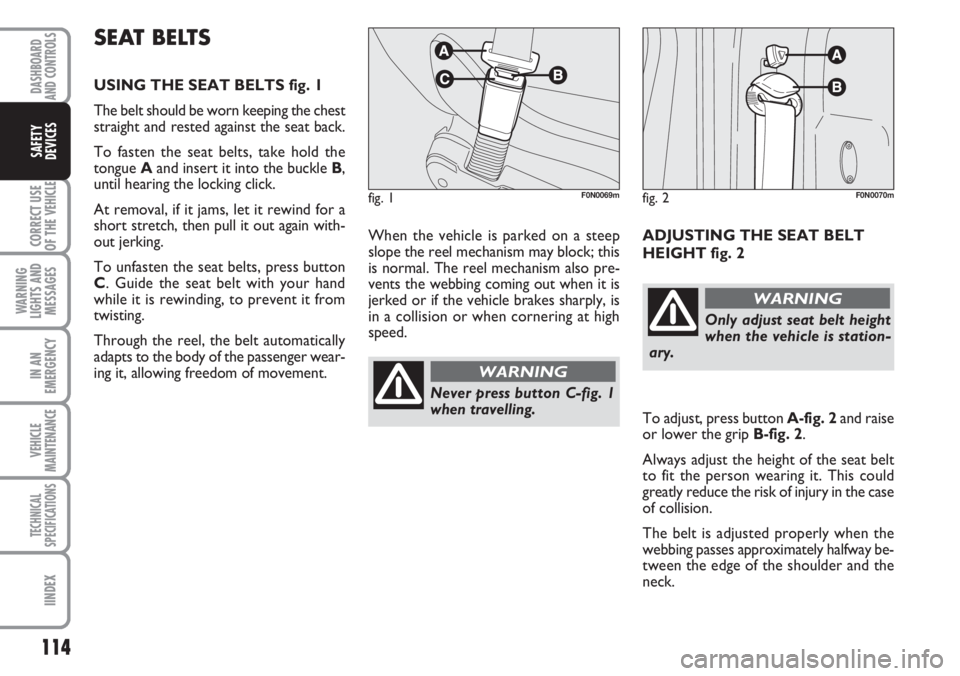
114
CORRECT USE
OF THE
VEHICLE
WARNING
LIGHTS AND
MESSAGES
IN AN
EMERGENCY
VEHICLE
MAINTENANCE
TECHNICAL
SPECIFICATIONS
IINDEX
DASHBOARD
AND CONTROLS
SAFETY
DEVICES
When the vehicle is parked on a steep
slope the reel mechanism may block; this
is normal. The reel mechanism also pre-
vents the webbing coming out when it is
jerked or if the vehicle brakes sharply, is
in a collision or when cornering at high
speed.ADJUSTING THE SEAT BELT
HEIGHT fig. 2
SEAT BELTS
USING THE SEAT BELTS fig. 1
The belt should be worn keeping the chest
straight and rested against the seat back.
To fasten the seat belts, take hold the
tongue Aand insert it into the buckle B,
until hearing the locking click.
At removal, if it jams, let it rewind for a
short stretch, then pull it out again with-
out jerking.
To unfasten the seat belts, press button
C. Guide the seat belt with your hand
while it is rewinding, to prevent it from
twisting.
Through the reel, the belt automatically
adapts to the body of the passenger wear-
ing it, allowing freedom of movement.
fig. 1F0N0069mfig. 2F0N0070m
Never press button C-fig. 1
when travelling.
WARNING
Only adjust seat belt height
when the vehicle is station-
ary.
WARNING
To adjust, press button A-fig. 2and raise
or lower the grip B-fig. 2.
Always adjust the height of the seat belt
to fit the person wearing it. This could
greatly reduce the risk of injury in the case
of collision.
The belt is adjusted properly when the
webbing passes approximately halfway be-
tween the edge of the shoulder and the
neck.
Page 116 of 282
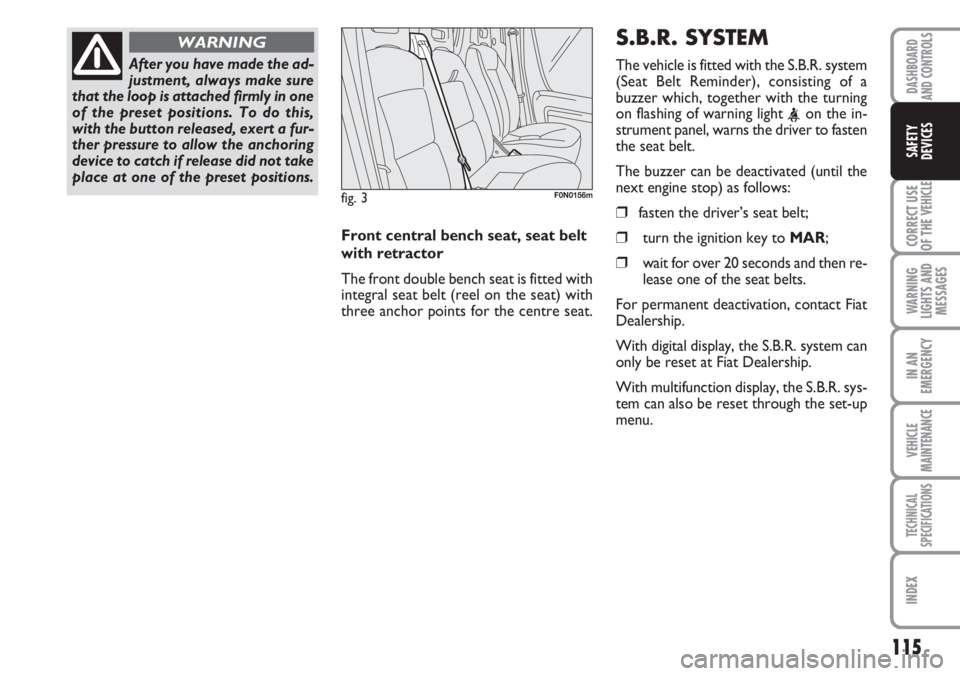
115
CORRECT USE
OF THE
VEHICLE
WARNING
LIGHTS AND
MESSAGES
IN AN
EMERGENCY
VEHICLE
MAINTENANCE
TECHNICAL
SPECIFICATIONS
INDEX
DASHBOARD
AND CONTROLS
SAFETY
DEVICES
After you have made the ad-
justment, always make sure
that the loop is attached firmly in one
of the preset positions. To do this,
with the button released, exert a fur-
ther pressure to allow the anchoring
device to catch if release did not take
place at one of the preset positions.
WARNING
Front central bench seat, seat belt
with retractor
The front double bench seat is fitted with
integral seat belt (reel on the seat) with
three anchor points for the centre seat.
fig. 3F0N0156m
S.B.R. SYSTEM
The vehicle is fitted with the S.B.R. system
(Seat Belt Reminder), consisting of a
buzzer which, together with the turning
on flashing of warning light
the seat belt.
The buzzer can be deactivated (until the
next engine stop) as follows:
❒fasten the driver’s seat belt;
❒turn the ignition key to MAR;
❒wait for over 20 seconds and then re-
lease one of the seat belts.
For permanent deactivation, contact Fiat
Dealership.
With digital display, the S.B.R. system can
only be reset at Fiat Dealership.
With multifunction display, the S.B.R. sys-
tem can also be reset through the set-up
menu.
Page 117 of 282
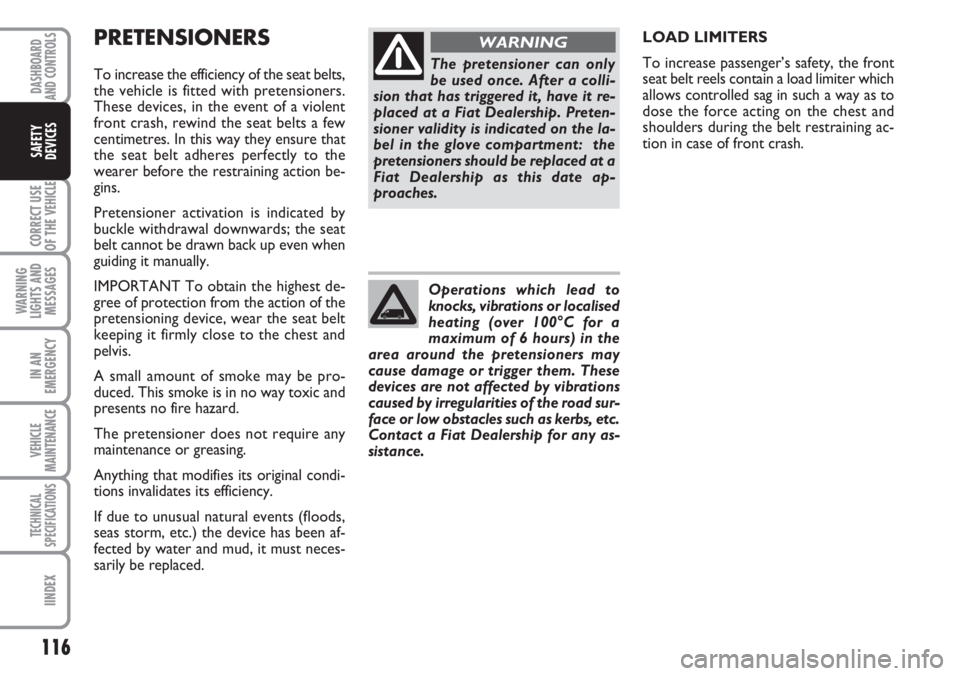
116
CORRECT USE
OF THE
VEHICLE
WARNING
LIGHTS AND
MESSAGES
IN AN
EMERGENCY
VEHICLE
MAINTENANCE
TECHNICAL
SPECIFICATIONS
IINDEX
DASHBOARD
AND CONTROLS
SAFETY
DEVICES
PRETENSIONERS
To increase the efficiency of the seat belts,
the vehicle is fitted with pretensioners.
These devices, in the event of a violent
front crash, rewind the seat belts a few
centimetres. In this way they ensure that
the seat belt adheres perfectly to the
wearer before the restraining action be-
gins.
Pretensioner activation is indicated by
buckle withdrawal downwards; the seat
belt cannot be drawn back up even when
guiding it manually.
IMPORTANT To obtain the highest de-
gree of protection from the action of the
pretensioning device, wear the seat belt
keeping it firmly close to the chest and
pelvis.
A small amount of smoke may be pro-
duced. This smoke is in no way toxic and
presents no fire hazard.
The pretensioner does not require any
maintenance or greasing.
Anything that modifies its original condi-
tions invalidates its efficiency.
If due to unusual natural events (floods,
seas storm, etc.) the device has been af-
fected by water and mud, it must neces-
sarily be replaced.LOAD LIMITERS
To increase passenger’s safety, the front
seat belt reels contain a load limiter which
allows controlled sag in such a way as to
dose the force acting on the chest and
shoulders during the belt restraining ac-
tion in case of front crash.The pretensioner can only
be used once. After a colli-
sion that has triggered it, have it re-
placed at a Fiat Dealership. Preten-
sioner validity is indicated on the la-
bel in the glove compartment: the
pretensioners should be replaced at a
Fiat Dealership as this date ap-
proaches.
WARNING
Operations which lead to
knocks, vibrations or localised
heating (over 100°C for a
maximum of 6 hours) in the
area around the pretensioners may
cause damage or trigger them. These
devices are not affected by vibrations
caused by irregularities of the road sur-
face or low obstacles such as kerbs, etc.
Contact a Fiat Dealership for any as-
sistance.
Page 118 of 282
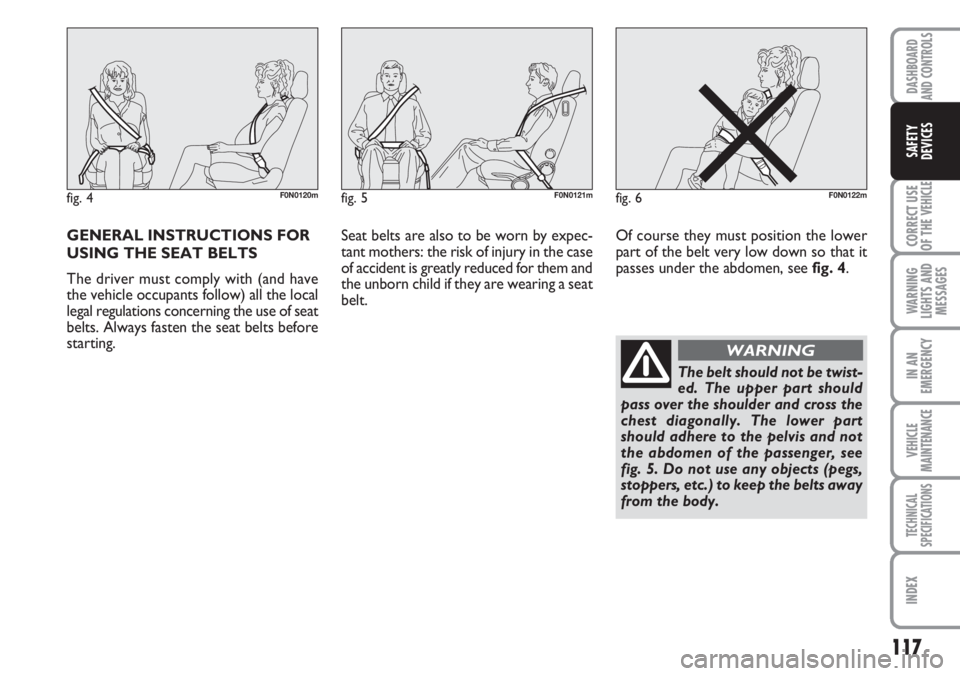
GENERAL INSTRUCTIONS FOR
USING THE SEAT BELTS
The driver must comply with (and have
the vehicle occupants follow) all the local
legal regulations concerning the use of seat
belts. Always fasten the seat belts before
starting.Seat belts are also to be worn by expec-
tant mothers: the risk of injury in the case
of accident is greatly reduced for them and
the unborn child if they are wearing a seat
belt.Of course they must position the lower
part of the belt very low down so that it
passes under the abdomen, see fig. 4.
117
CORRECT USE
OF THE
VEHICLE
WARNING
LIGHTS AND
MESSAGES
IN AN
EMERGENCY
VEHICLE
MAINTENANCE
TECHNICAL
SPECIFICATIONS
INDEX
DASHBOARD
AND CONTROLS
SAFETY
DEVICES
fig. 4F0N0120mfig. 5F0N0121mfig. 6F0N0122m
The belt should not be twist-
ed. The upper part should
pass over the shoulder and cross the
chest diagonally. The lower part
should adhere to the pelvis and not
the abdomen of the passenger, see
fig. 5. Do not use any objects (pegs,
stoppers, etc.) to keep the belts away
from the body.
WARNING
Page 119 of 282
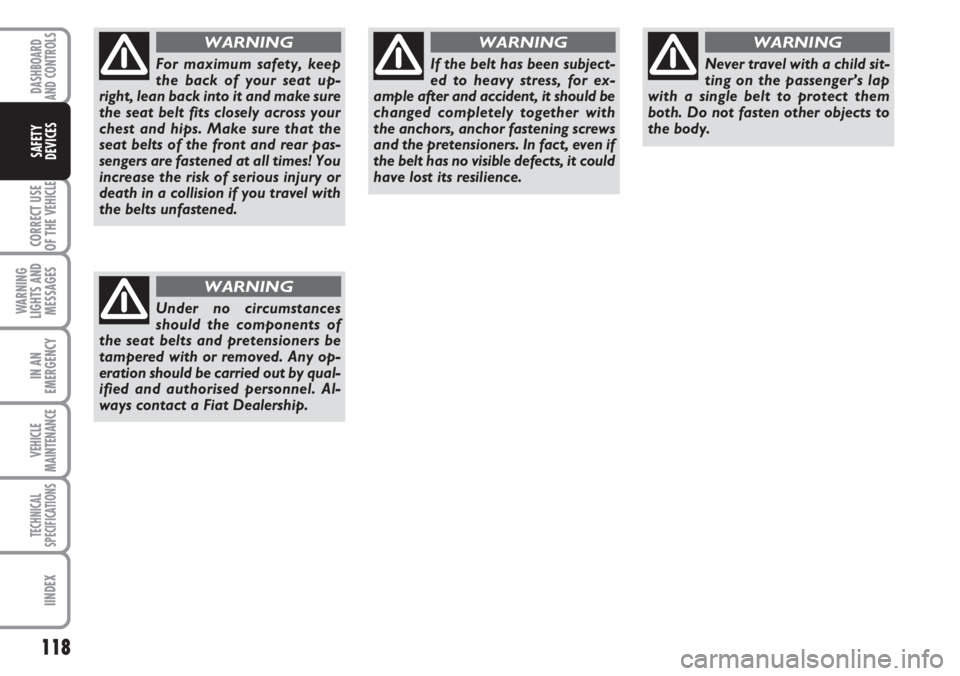
118
CORRECT USE
OF THE
VEHICLE
WARNING
LIGHTS AND
MESSAGES
IN AN
EMERGENCY
VEHICLE
MAINTENANCE
TECHNICAL
SPECIFICATIONS
IINDEX
DASHBOARD
AND CONTROLS
SAFETY
DEVICES
For maximum safety, keep
the back of your seat up-
right, lean back into it and make sure
the seat belt fits closely across your
chest and hips. Make sure that the
seat belts of the front and rear pas-
sengers are fastened at all times! You
increase the risk of serious injury or
death in a collision if you travel with
the belts unfastened.
WARNING
Under no circumstances
should the components of
the seat belts and pretensioners be
tampered with or removed. Any op-
eration should be carried out by qual-
ified and authorised personnel. Al-
ways contact a Fiat Dealership.
WARNING
If the belt has been subject-
ed to heavy stress, for ex-
ample after and accident, it should be
changed completely together with
the anchors, anchor fastening screws
and the pretensioners. In fact, even if
the belt has no visible defects, it could
have lost its resilience.
WARNING
Never travel with a child sit-
ting on the passenger’s lap
with a single belt to protect them
both. Do not fasten other objects to
the body.
WARNING
Page 120 of 282
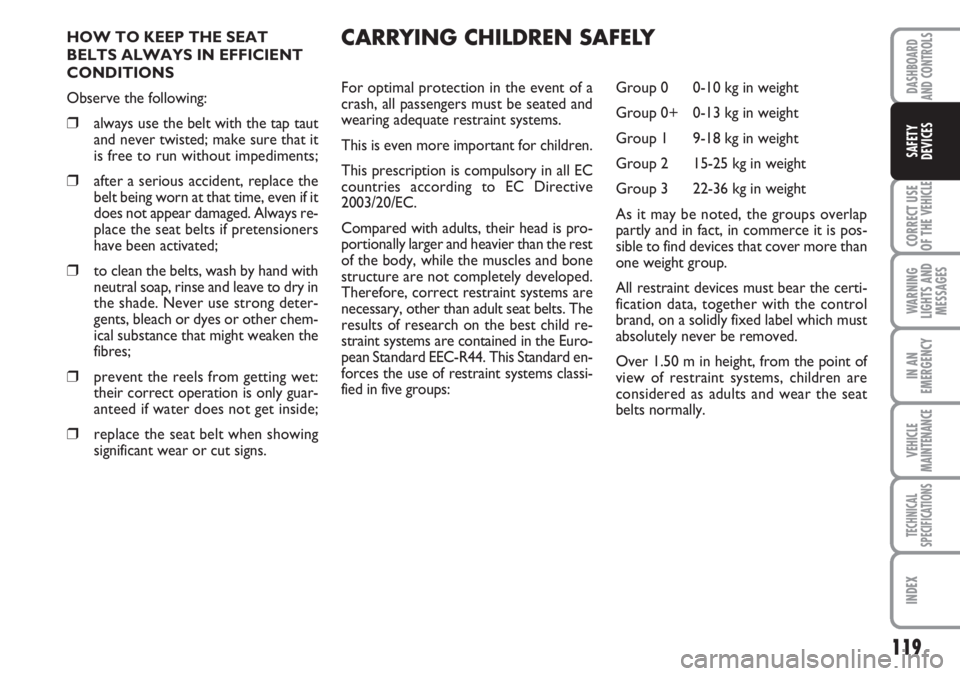
HOW TO KEEP THE SEAT
BELTS ALWAYS IN EFFICIENT
CONDITIONS
Observe the following:
❒always use the belt with the tap taut
and never twisted; make sure that it
is free to run without impediments;
❒after a serious accident, replace the
belt being worn at that time, even if it
does not appear damaged. Always re-
place the seat belts if pretensioners
have been activated;
❒to clean the belts, wash by hand with
neutral soap, rinse and leave to dry in
the shade. Never use strong deter-
gents, bleach or dyes or other chem-
ical substance that might weaken the
fibres;
❒prevent the reels from getting wet:
their correct operation is only guar-
anteed if water does not get inside;
❒replace the seat belt when showing
significant wear or cut signs.For optimal protection in the event of a
crash, all passengers must be seated and
wearing adequate restraint systems.
This is even more important for children.
This prescription is compulsory in all EC
countries according to EC Directive
2003/20/EC.
Compared with adults, their head is pro-
portionally larger and heavier than the rest
of the body, while the muscles and bone
structure are not completely developed.
Therefore, correct restraint systems are
necessary, other than adult seat belts. The
results of research on the best child re-
straint systems are contained in the Euro-
pean Standard EEC-R44. This Standard en-
forces the use of restraint systems classi-
fied in five groups:Group 0 0-10 kg in weight
Group 0+ 0-13 kg in weight
Group 1 9-18 kg in weight
Group 2 15-25 kg in weight
Group 3 22-36 kg in weight
As it may be noted, the groups overlap
partly and in fact, in commerce it is pos-
sible to find devices that cover more than
one weight group.
All restraint devices must bear the certi-
fication data, together with the control
brand, on a solidly fixed label which must
absolutely never be removed.
Over 1.50 m in height, from the point of
view of restraint systems, children are
considered as adults and wear the seat
belts normally.
119
CORRECT USE
OF THE
VEHICLE
WARNING
LIGHTS AND
MESSAGES
IN AN
EMERGENCY
VEHICLE
MAINTENANCE
TECHNICAL
SPECIFICATIONS
INDEX
DASHBOARD
AND CONTROLS
SAFETY
DEVICES
CARRYING CHILDREN SAFELY
Page 121 of 282
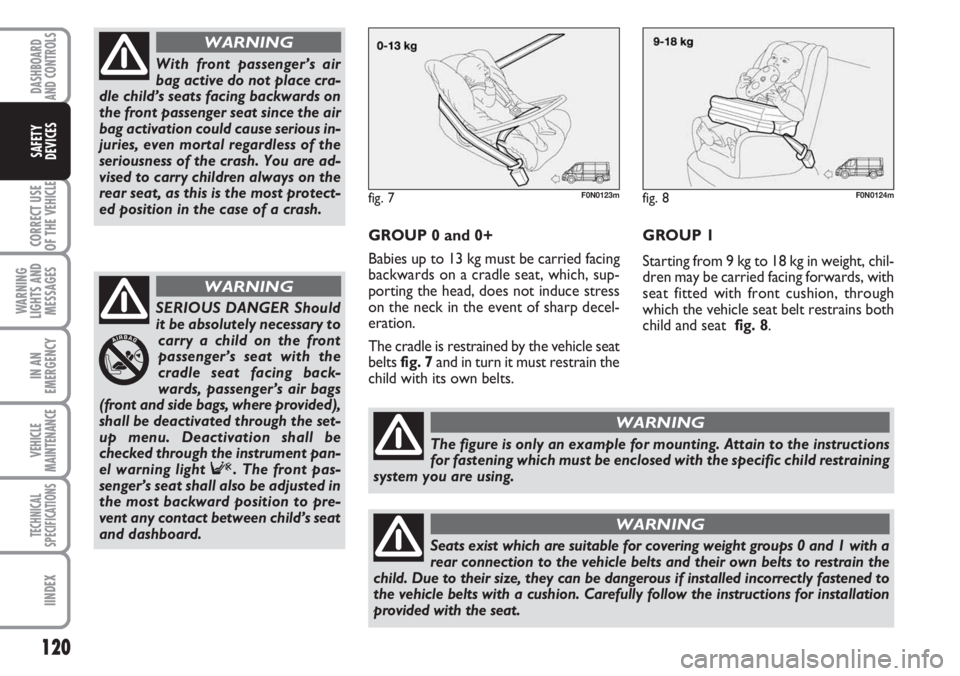
120
CORRECT USE
OF THE
VEHICLE
WARNING
LIGHTS AND
MESSAGES
IN AN
EMERGENCY
VEHICLE
MAINTENANCE
TECHNICAL
SPECIFICATIONS
IINDEX
DASHBOARD
AND CONTROLS
SAFETY
DEVICES
GROUP 0 and 0+
Babies up to 13 kg must be carried facing
backwards on a cradle seat, which, sup-
porting the head, does not induce stress
on the neck in the event of sharp decel-
eration.
The cradle is restrained by the vehicle seat
belts fig. 7and in turn it must restrain the
child with its own belts.
With front passenger’s air
bag active do not place cra-
dle child’s seats facing backwards on
the front passenger seat since the air
bag activation could cause serious in-
juries, even mortal regardless of the
seriousness of the crash. You are ad-
vised to carry children always on the
rear seat, as this is the most protect-
ed position in the case of a crash.
WARNING
SERIOUS DANGER Should
it be absolutely necessary to
carry a child on the front
passenger’s seat with the
cradle seat facing back-
wards, passenger’s air bags
(front and side bags, where provided),
shall be deactivated through the set-
up menu. Deactivation shall be
checked through the instrument pan-
el warning light F. The front pas-
senger’s seat shall also be adjusted in
the most backward position to pre-
vent any contact between child’s seat
and dashboard.
WARNING
fig. 7F0N0123m
The figure is only an example for mounting. Attain to the instructions
for fastening which must be enclosed with the specific child restraining
system you are using.
WARNING
Seats exist which are suitable for covering weight groups 0 and 1 with a
rear connection to the vehicle belts and their own belts to restrain the
child. Due to their size, they can be dangerous if installed incorrectly fastened to
the vehicle belts with a cushion. Carefully follow the instructions for installation
provided with the seat.
WARNING
fig. 8F0N0124m
GROUP 1
Starting from 9 kg to 18 kg in weight, chil-
dren may be carried facing forwards, with
seat fitted with front cushion, through
which the vehicle seat belt restrains both
child and seat fig. 8.
Page 122 of 282

121
CORRECT USE
OF THE
VEHICLE
WARNING
LIGHTS AND
MESSAGES
IN AN
EMERGENCY
VEHICLE
MAINTENANCE
TECHNICAL
SPECIFICATIONS
INDEX
DASHBOARD
AND CONTROLS
SAFETY
DEVICES
fig. 9F0N0125m
GROUP 2
Starting from 15 kg to 25 kg in weight, chil-
dren may be restrained directly by the ve-
hicle belts fig. 9. The only function of the
seat is to position the child correctly in re-
lation to the belts, so that the diagonal part
adheres to the chest and not to the neck
and that the horizontal part clings to the
child’s pelvis and not the abdomen.
The figure is only an exam-
ple for mounting. Attain to
the instructions for fastening which
must be enclosed with the specific
child restraining system you are using.
WARNING
GROUP 3
For children from 22 kg to 36 kg the size
of the child’s chest no longer requires a
support to space the child’s back from the
seat back.
Fig. 10shows proper child seat posi-
tioning on the rear seat.
fig. 10F0N0126m
The figure is only an exam-
ple for mounting. Attain to
the instructions for fastening which
must be enclosed with the specific
child restraining system you are using.
WARNING
Children taller than 1.50 m can wear seat
belts like adults.
Page 123 of 282
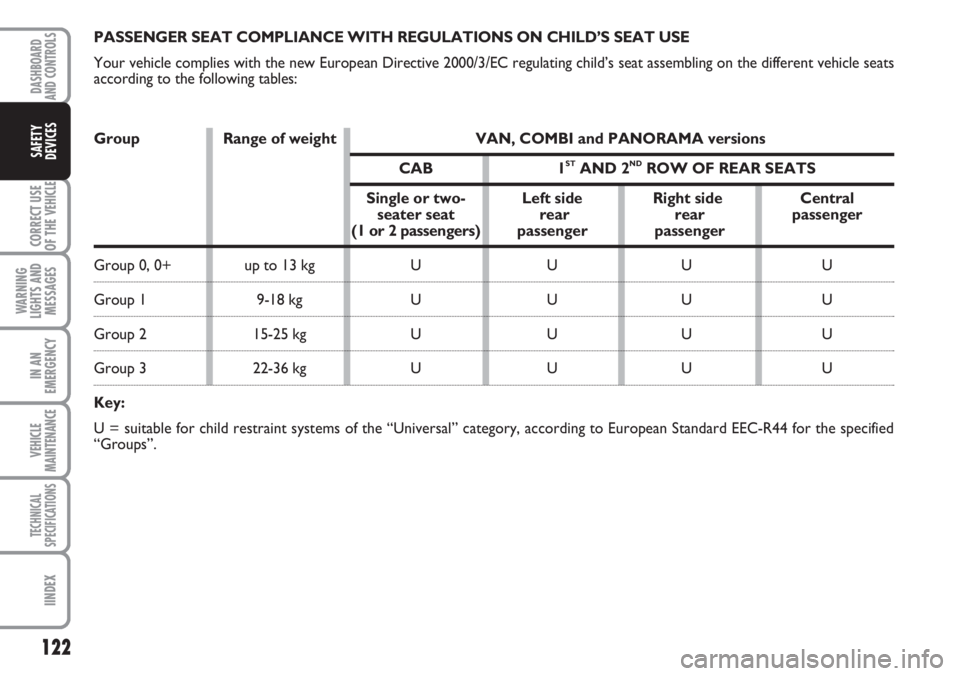
122
CORRECT USE
OF THE
VEHICLE
WARNING
LIGHTS AND
MESSAGES
IN AN
EMERGENCY
VEHICLE
MAINTENANCE
TECHNICAL
SPECIFICATIONS
IINDEX
DASHBOARD
AND CONTROLS
SAFETY
DEVICES
PASSENGER SEAT COMPLIANCE WITH REGULATIONS ON CHILD’S SEAT USE
Your vehicle complies with the new European Directive 2000/3/EC regulating child’s seat assembling on the different vehicle seats
according to the following tables:
Group Range of weight VAN, COMBI and PANORAMA versions
CAB 1STAND 2NDROW OF REAR SEATS
Single or two- Left side Right side Central
seater seat rear rear passenger
(1 or 2 passengers) passenger passenger
Group 0, 0+ up to 13 kg U U U U
Group 1 9-18 kg U U U U
Group 2 15-25 kg U U U U
Group 3 22-36 kg U U U U
Key:
U = suitable for child restraint systems of the “Universal” category, according to European Standard EEC-R44 for the specified
“Groups”.
Page 124 of 282
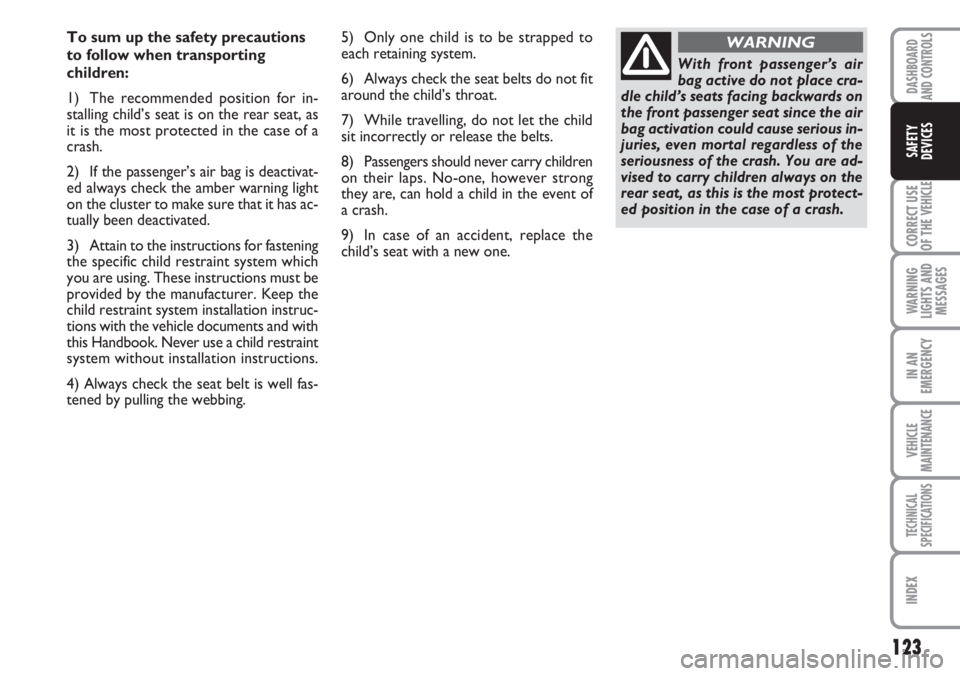
123
CORRECT USE
OF THE
VEHICLE
WARNING
LIGHTS AND
MESSAGES
IN AN
EMERGENCY
VEHICLE
MAINTENANCE
TECHNICAL
SPECIFICATIONS
INDEX
DASHBOARD
AND CONTROLS
SAFETY
DEVICES
To sum up the safety precautions
to follow when transporting
children:
1) The recommended position for in-
stalling child’s seat is on the rear seat, as
it is the most protected in the case of a
crash.
2) If the passenger’s air bag is deactivat-
ed always check the amber warning light
on the cluster to make sure that it has ac-
tually been deactivated.
3) Attain to the instructions for fastening
the specific child restraint system which
you are using. These instructions must be
provided by the manufacturer. Keep the
child restraint system installation instruc-
tions with the vehicle documents and with
this Handbook. Never use a child restraint
system without installation instructions.
4) Always check the seat belt is well fas-
tened by pulling the webbing.5) Only one child is to be strapped to
each retaining system.
6) Always check the seat belts do not fit
around the child’s throat.
7) While travelling, do not let the child
sit incorrectly or release the belts.
8) Passengers should never carry children
on their laps. No-one, however strong
they are, can hold a child in the event of
a crash.
9) In case of an accident, replace the
child’s seat with a new one.
With front passenger’s air
bag active do not place cra-
dle child’s seats facing backwards on
the front passenger seat since the air
bag activation could cause serious in-
juries, even mortal regardless of the
seriousness of the crash. You are ad-
vised to carry children always on the
rear seat, as this is the most protect-
ed position in the case of a crash.
WARNING